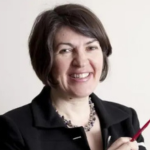Learning To Be The Boss – What It Takes To Lead An Early Years Setting

Being in charge isn’t easy, argues June O’Sullivan MBE – it takes commitment, effort and determination… When I was appointed CEO of my organisation I decided I needed to know more about building and growing a business, so I completed an MBA. What became apparent during the course was the role good leadership played on […]

- by June O'Sullivan OBE
- CEO of the London Early Years Foundation Visit website

Being in charge isn’t easy, argues June O’Sullivan MBE – it takes commitment, effort and determination… When I was appointed CEO of my organisation I decided I needed to know more about building and growing a business, so I completed an MBA. What became apparent during the course was the role good leadership played on the path to success, no matter what sector. In fact I was so struck by the power of leadership above all else that I wrote a book about it, the second edition of which has just been published. Leadership isn’t easy, and gets harder the more complex your organisation becomes; if it were easy, we would have many more good leaders than we have. We don’t have to look far to find high profile examples of poor leadership in every area, from politics and banking to charities. In early years settings, we know that the better the leadership, the better the guarantee of high quality, which is particularly important for those leading settings for children from disadvantaged and challenging backgrounds.
Leadership champions
However, we must be careful not to make leadership seem so hard that it becomes unattainable, something to leave to the superheroes. Ordinary people can become great leaders through enthusiasm, commitment, effort and determination – as well as a sense of humour and not taking yourself too seriously! When writing my book, I asked a range of people why they wanted to be leaders, given its challenges. The responses were varied. Some people want to lead because they have a vision they want to share and bring alive, or because they possess a drive to influence. Others have leadership thrust upon them by being in the right place at the right time. Sometimes people simply move up the ranks, eventually finding themselves at the top.
The majority commented on having a champion – a colleague who coached and mentored them through their career. Many of these champions worked in organisations that nurtured leadership at every level, where staff are talent-spotted and fitted to the right position. Of course, once you become a leader you have a duty to create a learning organisation with opportunities for others to develop and become the next generation of leaders. At the London Early Years Foundation (LEYF), our Aspiring Leaders programme has been key to the retention and promotion of staff. 70% of staff are now recruited from within the organisation, and all are prepared to go the extra mile.
Being successful
Successful leaders are able to do three things: behave in a particular way; understand the needs of people and circumstances; and apply certain leadership styles at the right time. They have acute self-awareness and emotional intelligence, and are sensitive to how they can build trust and support staff, especially when leading change. Leaders also need to stand up for what they believe, and be prepared to be ‘disruptive influencers’. This is critical in a sector where we have to advocate for the most vulnerable in society. We know it’s possible because of campaigns such as #OfstedBigConversation or Men in Childcare. So, to all those in charge – be passionate and believe in what you do. Be ‘out there’ and lead from where staff can see you. Set good examples and think, think, think. Communicate; give context and meaning. Take responsibility and be accountable. Make things happen, persevere and have patience, but also remember to relax and reward yourself for a job well done!
June O’Sullivan MBE is the CEO of the London Early Years Foundation; you can find her personal blog at juneosullivan.wordpress.com, and follow her at @JuneOSullivan










